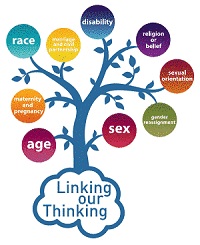UK EQUALITY ACT: Worker protection is now a simpler unified legal framework.
United Kingdom Equality Act 2010 covers workplace discrimination towards sex, age, religion, and more.
The concept replaces many separate pieces of outdated legislation from previous decades.
The UK Equality Act 2010, and its updated list of workplace laws, addresses certain areas of ‘prohibited conduct’.
Prohibited conduct gets defined as discrimination and a failure to make the reasonable adjustments for workers with disabilities.
That means it is unlawful to use discriminatory language or prejudicial actions towards anyone employed in the workplace.
Protected Equality Characteristics
- Age

- Disability
- Race
- Sex
- Sexual orientation
- Gender reassignment
- Marriage and civil partnership
- Pregnancy and maternity
- Religion or belief
- Membership (or non-membership) of a trade union
As a rule, the law on equality assigns the same protection to each of the characteristics. But, there a few notable exceptions that apply in some specific areas of UK employment law.
Victims of discrimination at work can make a claim to an Employment Tribunal. Compensation could get awarded for any damage or loss. Reimbursements might also get paid for any suffering or injury to an individual’s feelings.
Definition of Disability Under the Equality Act 2010
Under the Equality Act 2010 an individual would be disabled if they have a physical or mental impairment that has a ‘substantial’ and ‘long-term’ negative effect on their ability to do daily activities.
Meaning of ‘Substantial’ and ‘Long-term’
Substantial: Means more than minor or trivial. An example would be if it takes much longer than usual to complete a daily task such as getting dressed.
Long-term: Means 12 months or more. An example would be a breathing condition that develops as a result of a lung infection.
Note: There are special rules about recurring or fluctuating conditions (e.g. arthritis).
What is a Progressive Condition?
The law defines a progressive condition as one which gets worse over time. People with progressive conditions get classed as disabled. But, you automatically meet the disability definition under the Equality Act 2010 from the day of your diagnosis with:
- HIV Infection
- Cancer
- Multiple Sclerosis
What does not Count as a Disability?
Separate guidance covers conditions that are not specifically covered by the definition of a disability. An example could be an individual having an addiction to alcohol or non–prescribed drugs.
Note: The Equality Act 2010 does not apply to Northern Ireland.

